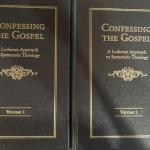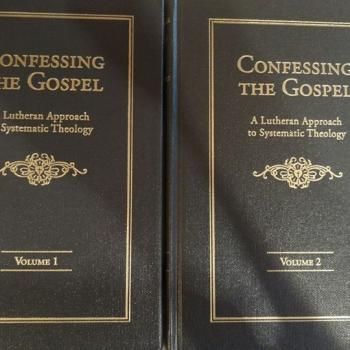In this second part of my review of Confessing the Gospel: A Lutheran Approach to Systematic Theology, I explore the section on the doctrine of God. This is done in two parts: the Trinity, and the attributes of God, which are ad dressed in separate posts. This article was written by John F. Johnson, who is a frequent contributor to Concordia Theological Quarterly on the doctrine of God and other related ideas. In perusing some of his articles, it is clear that Johnson has a strong grasp on philosophy, as he often interacts with twentieth century philosophers in his writing. This is especially important for one writing on Theology Proper.
dressed in separate posts. This article was written by John F. Johnson, who is a frequent contributor to Concordia Theological Quarterly on the doctrine of God and other related ideas. In perusing some of his articles, it is clear that Johnson has a strong grasp on philosophy, as he often interacts with twentieth century philosophers in his writing. This is especially important for one writing on Theology Proper.
Johnson begins this section by noting the problem of speech about God, and overviews some modern questions in this regard. He notes that questions about God are not strictly philosophical ones, but that they are addressed primarily in the sphere of experience, rather than speculation. He then proceeds to develop a doctrine of God through a study of the Old and New Testaments through which he explains his central characteristics. Johnson notes that God is introduced by way of his deeds and actions within history, beginning with creation and then continued through his acts of redemption (47). He pays particular attention to the fact that God reveals himself as both wrathful and loving, through his words of both law and gospel, which gives a particularly Lutheran orientation to his understanding of God.
The Trinity
The Trinitarian nature of God is discussed, by Johnson, prior to an exposition of the divine attributes. This reflects the orientation of the Augsburg Confession as opposed to the scholastic tradition following Gerhard which first defines God in a general sense, followed by an exposition of the Trinity. There are, I think, benefits to this approach, as Triunity is central to God’s nature, and any true theological understanding. In his explanation of the Confessional teaching, he demonstrates that the Lutheran Confessions simply reiterate the Patristic ideas of the Triune God, without any new developments (65). The differences are never in the doctrine of God as such, but in the application of God’s attributes to the sinner in pastoral care through law and gospel (70).
Johnson’s overview of the history of Trinitarian debate is pretty standard, and is adequate for a short treatment on complex issues. One aspect of his writing which is neglected in some others is that he notes the difference between Augustinian and Eastern approaches to the Trinity. Augustine emphasizes God’s unity, whereas the Eastern fathers begin with the persons. Johnson seems to prefer the Eastern approach as more thoroughly Trinitarian (74-75). I am sympathetic to this conception as well.
The systematic formulation expressed here is helpful. He argues that the Father is the source of the Godhead, and that when Scripture uses the title “God,” it is not referencing the divine essence in general, but the Father in particular. He draws on some contemporary theologians, such as Richard Bauckham who has emphasized the concept of divine identity in Paul’s Trinitarian formulation. He also interacts with Karl Rahner, Emil Brunner, and Thomas Oden. I appreciate that Johnson does discuss material from outside of the Lutheran tradition, and this article speaks clearly to Trinitarian debate throughout Christendom.
Conclusion
This section is a significant improvement from the Prolegomena which I found, not to be inaccurate, but lacking in several important details. Johnson demonstrates a strong understanding of Trinitarian debates in the early church as well as some of the philosophical issues surrounding these discussions. There is still a lot that I wish was included here, but I understand that not everything can be done within the limited space given to each topic.










